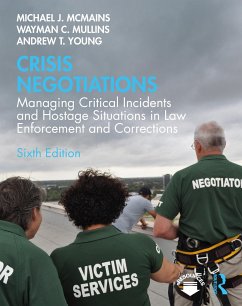Crisis Negotiations: Managing Critical Incidents and Hostage Situations in Law Enforcement and Corrections, the sixth edition, is an invaluable resource for mitigating, managing, or responding to high-risk negotiation incidents.
This revision includes the current research on negotiating high-risk incidents in the classroom and the field. It includes an applied analysis of the value of psychopathology to high-risk perpetrators. It refines the "empirical eclecticism" introduced in the fourth edition to provide a conceptual basis for crisis negotiations. The authors include summary bullet points at the end of each chapter for easy reference when negotiators are in the field and a review of the literature since the last edition appeared. Their discussion of the strategic planning process involved in high-risk negotiation incidents focuses clearly on the critical questions negotiators need to ask themselves about any high-risk incident and provides a practical approach to the psychology of individuals that engage in high-risk incidents.
Known as "the bible" to experienced professionals in the field, this sixth edition of Crisis Negotiations is vital for practitioners as well as for criminology, criminal justice or psychology courses in crisis management, applied psychology, and special operations in law enforcement and corrections. Instructors will find it well supported by ancillary materials including discussion questions, slide presentations, and a test bank, as well as case studies and self-assessment quizzes for students, making it easy to develop a first-time course or to integrate it into an existing course.
This revision includes the current research on negotiating high-risk incidents in the classroom and the field. It includes an applied analysis of the value of psychopathology to high-risk perpetrators. It refines the "empirical eclecticism" introduced in the fourth edition to provide a conceptual basis for crisis negotiations. The authors include summary bullet points at the end of each chapter for easy reference when negotiators are in the field and a review of the literature since the last edition appeared. Their discussion of the strategic planning process involved in high-risk negotiation incidents focuses clearly on the critical questions negotiators need to ask themselves about any high-risk incident and provides a practical approach to the psychology of individuals that engage in high-risk incidents.
Known as "the bible" to experienced professionals in the field, this sixth edition of Crisis Negotiations is vital for practitioners as well as for criminology, criminal justice or psychology courses in crisis management, applied psychology, and special operations in law enforcement and corrections. Instructors will find it well supported by ancillary materials including discussion questions, slide presentations, and a test bank, as well as case studies and self-assessment quizzes for students, making it easy to develop a first-time course or to integrate it into an existing course.








